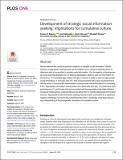Files in this item
Development of strategic social information seeking : implications for cumulative culture
Item metadata
| dc.contributor.author | Blakey, Kirsten H | |
| dc.contributor.author | Rafetseder, Eva | |
| dc.contributor.author | Atkinson, Mark | |
| dc.contributor.author | Renner, Elizabeth | |
| dc.contributor.author | Cowan-Forsythe, Fia | |
| dc.contributor.author | Sati, Shivani J | |
| dc.contributor.author | Caldwell, Christine A | |
| dc.date.accessioned | 2021-09-15T17:30:14Z | |
| dc.date.available | 2021-09-15T17:30:14Z | |
| dc.date.issued | 2021-08-24 | |
| dc.identifier | 275885933 | |
| dc.identifier | 58a4dcb6-dd31-4df4-8871-b0b7e1a8ad7e | |
| dc.identifier | 000687944100033 | |
| dc.identifier | 85114848678 | |
| dc.identifier.citation | Blakey , K H , Rafetseder , E , Atkinson , M , Renner , E , Cowan-Forsythe , F , Sati , S J & Caldwell , C A 2021 , ' Development of strategic social information seeking : implications for cumulative culture ' , PLoS ONE , vol. 16 , no. 8 , e0256605 . https://doi.org/10.1371/journal.pone.0256605 | en |
| dc.identifier.issn | 1932-6203 | |
| dc.identifier.other | RIS: urn:2C6F3A6D982AEF62009FABC5B2A1141A | |
| dc.identifier.uri | https://hdl.handle.net/10023/23965 | |
| dc.description | KHB: PhD studentship funded by the Division of Psychology, University of Stirling. CAC: 648841 RATCHETCOG ERC-2014-CoG European Research Council https://erc.europa.eu/ | en |
| dc.description.abstract | Human learners are rarely the passive recipients of valuable social information. Rather, learners usually have to actively seek out information from a variety of potential others to determine who is in a position to provide useful information. Yet, the majority of developmental social learning paradigms do not address participants' ability to seek out information for themselves. To investigate age-related changes in children's ability to seek out appropriate social information, 3- to 8-year-olds (N = 218) were presented with a task requiring them to identify which of four possible demonstrators could provide critical information for unlocking a box. Appropriate information seeking improved significantly with age. The particularly high performance of 7- and 8-year-olds was consistent with the expectation that older children's increased metacognitive understanding would allow them to identify appropriate information sources. Appropriate social information seeking may have been overlooked as a significant cognitive challenge involved in fully benefiting from others' knowledge, potentially influencing understanding of the phylogenetic distribution of cumulative culture. | |
| dc.format.extent | 22 | |
| dc.format.extent | 1897802 | |
| dc.language.iso | eng | |
| dc.relation.ispartof | PLoS ONE | en |
| dc.subject | BF Psychology | en |
| dc.subject | DAS | en |
| dc.subject.lcc | BF | en |
| dc.title | Development of strategic social information seeking : implications for cumulative culture | en |
| dc.type | Journal article | en |
| dc.contributor.institution | University of St Andrews. School of Management | en |
| dc.identifier.doi | 10.1371/journal.pone.0256605 | |
| dc.description.status | Peer reviewed | en |
| dc.identifier.url | https://journals.plos.org/plosone/article?id=10.1371/journal.pone.0256605#sec013 | en |
This item appears in the following Collection(s)
Items in the St Andrews Research Repository are protected by copyright, with all rights reserved, unless otherwise indicated.

